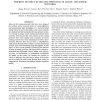Free Online Productivity Tools
i2Speak
i2Symbol
i2OCR
iTex2Img
iWeb2Print
iWeb2Shot
i2Type
iPdf2Split
iPdf2Merge
i2Bopomofo
i2Arabic
i2Style
i2Image
i2PDF
iLatex2Rtf
Sci2ools
130
click to vote
GLOBECOM
2007
IEEE
2007
IEEE
Inherent Security of Routing Protocols in Ad-Hoc and Sensor Networks
Many of the routing protocols that have been designed for wireless ad-hoc networks focus on energy-efficiency and guaranteeing high throughput in a non-adversarial setting. However, given that ad-hoc and sensor networks are deployed and left unattended for long periods of time, it is crucial to design secure routing protocols for these networks. Over the past few years, attacks on the routing protocols have been studied and a number of secure routing protocols have been designed for wireless sensor networks. However, there has not been a comprehensive study of how these protocols compare in terms of achieving security goals and maintaining high throughput. In this paper, we focus on the problem of analyzing the inherent security of routing protocols with respect to two categories: multi-path and single-path routing. Within each category, we focus on deterministic vs. probabilistic mechanisms for setting up the routes. We consider the scenario in which an adversary has subverted a sub...
GLOBECOM 2007 | Routing Protocols | Secure Routing Protocols | Sensor Networks | Telecommunications |
Related Content
| Added | 02 Jun 2010 |
| Updated | 02 Jun 2010 |
| Type | Conference |
| Year | 2007 |
| Where | GLOBECOM |
| Authors | Tanya Roosta, Sameer Pai, Phoebus Chen, Shankar Sastry, Stephen B. Wicker |
Comments (0)

